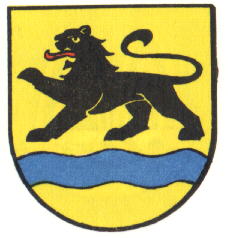Birenbach: Difference between revisions
Jump to navigation
Jump to search
Knorrepoes (talk | contribs) No edit summary |
Knorrepoes (talk | contribs) m (Text replace - "[[Literature" to "{{media}} [[Literature") |
||
| Line 17: | Line 17: | ||
====Origin/meaning==== | ====Origin/meaning==== | ||
As no old seals or arms were known for Birenbach, the above arms were devised in 1958. The lion is taken from the arms of the Staufen family, and symbolises the former Estate of Büren-Hohensatufen to which the village belonged. The blue bar is canting (Bach=brook) for the last part of the name. | As no old seals or arms were known for Birenbach, the above arms were devised in 1958. The lion is taken from the arms of the Staufen family, and symbolises the former Estate of Büren-Hohensatufen to which the village belonged. The blue bar is canting (Bach=brook) for the last part of the name. | ||
{{media}} | |||
[[Literature]] : Gönner and Bardua, 1966 | [[Literature]] : Gönner and Bardua, 1966 | ||
Revision as of 19:00, 8 July 2014
| Heraldry of the World Civic heraldry of Germany - Deutsche Wappen (Gemeindewappen/Kreiswappen) |
BIRENBACH
State : Baden-Württembergbr> District (Kreis) : Göppingen
Official blazon
In Gold über einem erniedrigten blauen Wellenbalken ein schreitender rotbezungter schwarzer Löwe.
Origin/meaning
As no old seals or arms were known for Birenbach, the above arms were devised in 1958. The lion is taken from the arms of the Staufen family, and symbolises the former Estate of Büren-Hohensatufen to which the village belonged. The blue bar is canting (Bach=brook) for the last part of the name.
Contact and Support
Partners:
Your logo here ?
Contact us
© since 1995, Heraldry of the World, Ralf Hartemink 
Index of the site
Literature : Gönner and Bardua, 1966











